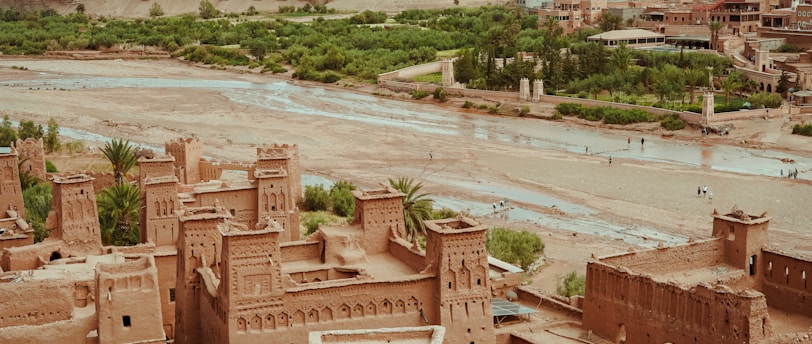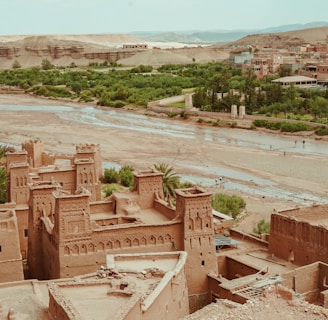Essential Travel Tips for Exploring Morocco
2/16/20259 min read


Visa Requirements and Entry
When planning a trip to Morocco, it is essential to understand the visa requirements based on your nationality. Citizens of several countries can visit Morocco without a visa for varying durations, typically ranging from 90 to 180 days. For instance, travelers from the European Union, the United States, Canada, and many South American countries can enter Morocco without a prior visa. However, it is crucial to verify specific requirements that apply to your nationality, as regulations may change.
For nationalities that do require a visa, the process generally involves submitting an application to the nearest Moroccan consulate or embassy. The required documents typically include a valid passport, recent passport-sized photographs, proof of accommodation, and details of your travel itinerary. It is advisable to approach the application process well in advance of your intended travel dates, as processing times may vary. Fees associated with visa applications also vary depending on the type of visa being requested.
Furthermore, travelers should ensure their passport remains valid for at least six months beyond their date of entry into Morocco. It is also recommended to have a return ticket and carry relevant documentation that could prove financial stability during your stay. Each visitor should familiarize themselves with the customs regulations in Morocco, as certain items may be restricted or require declarations upon entry. Understanding these entry regulations can help ensure a smoother arrival process.
Before departing, it is prudent for travelers to check official resources or reach out to a consulate to confirm the most current visa and entry requirements. Taking these steps will help ensure a well-prepared visit to Morocco, paving the way for a memorable experience in this vibrant country.
Health Precautions
Traveling to Morocco offers a unique and enriching experience, but it is essential to prioritize health precautions while exploring this vibrant country. Before embarking on your journey, it is advisable to consult with a healthcare provider regarding recommended vaccinations. Common vaccinations for travelers to Morocco include those for hepatitis A, hepatitis B, typhoid, and rabies, especially for those planning to visit rural areas or engage in outdoor activities. Ensuring that routine vaccinations are up to date, such as tetanus-diphtheria and measles, is equally important.
Another critical aspect of maintaining health during your trip is securing adequate health insurance. Travelers should consider purchasing a comprehensive travel insurance policy that covers medical expenses, including emergency evacuations. It is vital to check whether the insurance extends to international locations, as this will provide peace of mind in case of unexpected medical issues.
Hydration and water safety are paramount aspects of health precautions in Morocco. Travelers are strongly advised to drink bottled or boiled water to avoid gastrointestinal problems. Tap water may contain bacteria that could lead to illnesses such as diarrhea or gastroenteritis, which can significantly affect your travel experience. Alongside consuming safe drinking water, it is wise to practice good hygiene, such as washing hands frequently and sanitizing them when soap is unavailable.
In addition to focusing on water safety, consider bringing a basic medical kit that includes common medications for diarrhea, headaches, or allergies. Familiarizing oneself with local healthcare facilities is also prudent, particularly in urban areas where hospitals may be better equipped to handle emergencies.
By taking these health precautions, travelers can better protect their well-being and fully embrace the rich culture and stunning landscapes that Morocco has to offer.
Appropriate Clothing and Packing Tips
When traveling to Morocco, it is crucial to understand the cultural norms surrounding clothing to ensure a respectful and enjoyable experience. Morocco is a predominantly Muslim country, and modest dress is considered a sign of respect towards local customs and traditions. Both men and women are encouraged to dress conservatively, which typically means covering the arms and legs. Lightweight, loose-fitting clothing is advisable, as it allows for breathability and comfort in the warm climate.
For women, packing items such as long skirts, maxi dresses, and loose trousers can help maintain modesty while ensuring comfort. A light scarf can serve multiple purposes; it can be used to cover the head when visiting religious sites or simply provide additional warmth during cooler evenings. Men can opt for lightweight long-sleeve shirts and trousers, often in natural fabrics that allow for greater airflow, reducing discomfort from the heat.
Morocco’s climate varies significantly depending on the region and time of year. Coastal areas tend to be milder, while desert regions can be extremely hot during the day and chilly at night. It is beneficial to layer clothing to accommodate these temperature fluctuations. Having a light jacket or a cardigan can be practical for evenings or early mornings. Additionally, breathable fabric materials such as cotton, linen, or bamboo are recommended to enhance comfort throughout your travels.
Don’t forget sensible footgear—comfortable sandals for walking during hot days and sturdy shoes for excursions in rugged areas. Finally, considering the cultural significance of colors and patterns may enrich your experience; some travelers find wearing traditional Moroccan attire, such as a djellaba, enhances their engagement with the culture. Thoughtful packing and appropriate clothing choices will significantly contribute to a more immersive and respectful journey through Morocco.
Money Matters: Currency and Bargaining Tips
When traveling in Morocco, understanding the local currency and money-handling practices is essential for a smooth experience. The official currency is the Moroccan Dirham (MAD), which is further subdivided into 100 centimes. Travelers should familiarize themselves with the currency exchange rates prior to their trip to ensure they have a good understanding of what to expect when converting their money. Exchange services can be found at airports, banks, and specialized currency exchange offices throughout the country, although it is advisable to avoid exchanging large amounts at airports due to typically unfavorable rates.
Using credit or debit cards can be convenient for many transactions, particularly in larger cities and tourist areas; however, it is prudent to carry cash for small purchases, local markets, and remote areas where card facilities may not be accepted. Additionally, consider withdrawing cash from ATMs to attain a more favorable exchange rate than those offered at currency exchange counters.
Bargaining, a cultural practice in Morocco, is an essential skill for those shopping in locals' markets or souks. It is common for vendors to set inflated prices, anticipating that customers will negotiate. As a traveler, one should approach bargaining as a friendly interaction rather than a confrontation. Start by offering a price that is significantly lower than the asking price, which allows room for discussion. It is important to maintain a respectful and light-hearted demeanor, as building rapport with the seller can facilitate a more favorable outcome. Try to remain calm and patient, as hasty negotiations can lead to unfavorable agreements.
Shopping in Morocco can be a rewarding experience, and understanding the nuances of money management, including the handling of Moroccan Dirhams and effective bargaining strategies, equips travelers to engage fully with the vibrant local culture. Being knowledgeable about currency exchange and negotiation practices can enhance one’s travel experience significantly.
Understanding Local Culture and Customs
Exploring Morocco offers a unique opportunity to immerse oneself in a rich tapestry of culture and tradition. To enhance your travel experience, it is crucial to understand and respect the local customs that define Moroccan life. Moroccan society is marked by a blend of Berber, Arabic, and French influences, creating a vibrant cultural mosaic.
First and foremost, greetings play a significant role in social interactions. A simple "Salam Alaikum" (peace be upon you) is a common way to greet someone. It is customary to shake hands and maintain eye contact during this exchange, reflecting respect and sincerity. When entering a Moroccan home, it is polite to greet each person present and to offer a compliment, especially regarding their hospitality or home. Additionally, it is considered courteous to inquire about one’s health, which demonstrates interest in the other person's well-being.
Navigating local etiquette is equally important. Moroccans often value modesty and discretion in public behavior. It is advisable to dress conservatively, especially in rural areas, where traditional attire prevails. Furthermore, public displays of affection may be frowned upon, making it essential to maintain a respectful demeanor. Dining customs also highlight the importance of etiquette; it is common to share meals, and guests may be invited to partake in a traditional Moroccan meal, typically eaten with the right hand while sitting on a low table.
Lastly, learning a few basic phrases in Arabic or Berber can go a long way in building rapport with locals. Simple expressions like "Shukran" (thank you) or "Min fadlak" (please) not only enhance interactions but also show appreciation for Moroccan culture. Understanding these nuances fosters meaningful connections and allows travelers to engage more authentically with the beautiful people of Morocco.
Transportation Options in Morocco
Exploring Morocco can be an enriching experience, and understanding the transportation options available in the country is essential for travelers. One of the most efficient and convenient modes of intercity travel is the train service. The Moroccan railway network connects major cities such as Casablanca, Marrakech, and Fes, offering comfortable and reliable journeys. The ONCF (Office National des Chemins de Fer) operates these trains, which are relatively affordable and provide scenic views of the countryside along the way. For those who prefer a quicker means of transport, first-class tickets allow for added comfort and amenities.
In addition to trains, buses are another essential aspect of Morocco's transportation landscape. Bus services, like those provided by CTM and Supratours, extend beyond major cities to reach less accessible areas. These buses are generally well-maintained and offer a budget-friendly option for travelers looking to explore off-the-beaten-path destinations. It is advisable to book tickets in advance, particularly during peak travel seasons, to ensure availability and a smooth journey.
While taxis are a common mode of transport within cities, travelers should exercise caution. In larger cities, such as Marrakech and Casablanca, it is recommended to use officially marked taxis (often colored in blue or red) or taxi apps to ensure fair pricing. It's important to agree on a fare before starting your journey or ensure that the meter is running, as unregulated taxis might charge higher rates for tourists. Additionally, consider public transport options like trams and buses for local travel, which can provide a more authentic experience of Moroccan daily life.
By understanding and optimizing these transportation options, travelers can navigate Morocco more effectively, ensuring a delightful exploration of its rich culture and stunning landscapes.
Staying Safe While Traveling
Traveling to Morocco can be an exhilarating experience, filled with rich culture, stunning landscapes, and vibrant markets. However, like any destination, it is crucial to prioritize safety to ensure a memorable trip. One of the first considerations for travelers is to remain vigilant while exploring bustling areas, especially in popular tourist spots like Marrakech and Fez. These locations, while offering breathtaking sights, can sometimes be a backdrop for common tourist scams.
Some prevalent scams involve individuals posing as tour guides or locals who offer unsolicited assistance, often leading travelers to shops or eateries that pay them a commission. To avoid falling victim to these scams, it is advisable to conduct thorough research beforehand. Consider hiring reputable guides through recognized agencies, and always confirm the details of your arrangements in advance.
When navigating Morocco's vibrant markets, known as souks, be prepared for aggressive sales tactics and haggling. While bargaining is a customary practice, it is important to remain polite yet firm. Establishing a budget before entering the marketplace can help maintain control over spending and prevent impulse purchases, which can contribute to a more secure travel experience.
To further enhance personal safety, travelers should avoid displaying valuable items such as expensive jewelry or electronics in public spaces. Utilizing a money belt or a secure bag can protect important documents and cash. Additionally, staying aware of one’s surroundings and trusting one’s instincts is integral to avoiding potential risks.
Lastly, it is advisable to keep emergency contact numbers readily available and to inform family or friends about travel plans. By implementing these safety tips, travelers can navigate Morocco confidently and enjoy its rich offerings with peace of mind.
Accommodation Options: Riads and Hotels
When exploring the vibrant landscapes and rich cultures of Morocco, selecting suitable accommodation is essential for enhancing your travel experience. Among the premier choices available to travelers are traditional riads and modern hotels, each offering unique atmospheres and amenities that reflect the country’s diverse heritage.
Riads, traditional Moroccan houses, are typically centered around a courtyard and often feature intricate tilework, elaborate wood carvings, and lush gardens. Staying in a riad allows visitors to immerse themselves in Moroccan culture, providing a serene escape from the bustling streets of cities such as Marrakech or Fez. Many riads operate as small hospitality establishments, offering personalized service, home-cooked meals, and a chance to interact with local hosts. These accommodations cater to travelers seeking an authentic experience steeped in tradition.
In contrast, modern hotels in Morocco may provide a different set of conveniences and amenities. Ranging from luxurious resorts to budget-friendly options, hotels often feature contemporary designs, swimming pools, and a variety of dining choices. Travelers who prefer polished services, comprehensive facilities, and greater privacy may find hotels to be more suitable for their needs. These properties may be better equipped for business travelers or those looking to blend comfort with leisure.
When choosing between a riad and a hotel, consider your budget, preferences, and the type of experience you wish to have. For an intimate cultural experience, a riad may be ideal, while those in need of modern amenities and more extensive services may lean towards a hotel. Regardless of your choice, Morocco offers a wide array of accommodations that cater to the interests and tastes of any traveler.
